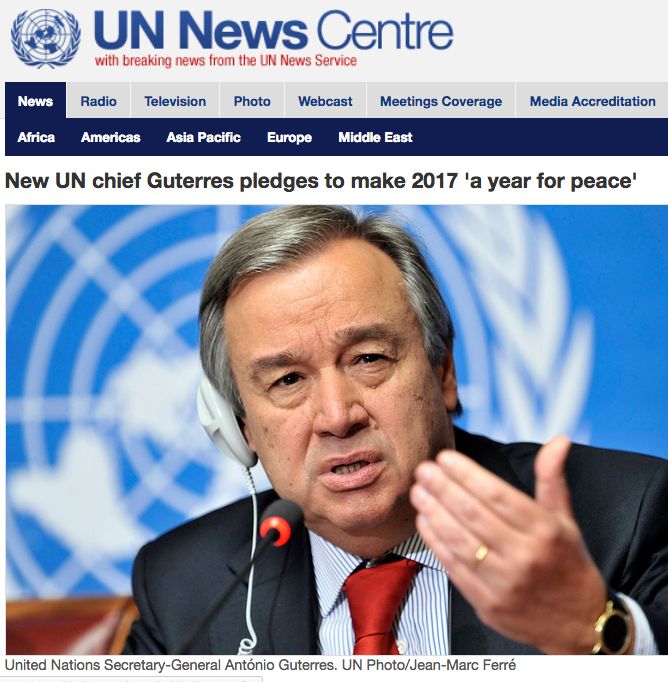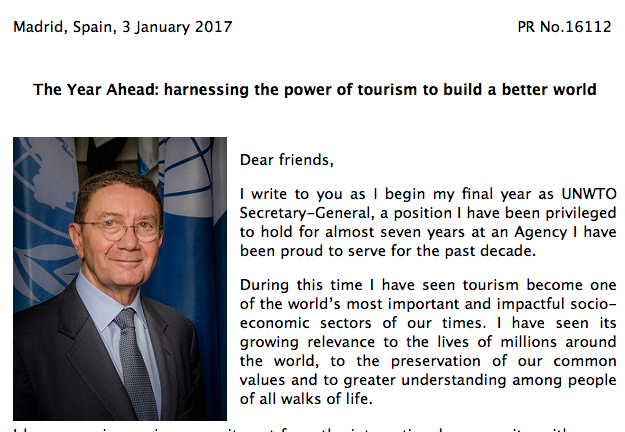
4 Jan, 2017
Two UN Chiefs set Travel & Tourism a challenging agenda for 2017 and beyond
Bangkok – New Year statements released by two top United Nations executives have set the stage for some heavy-duty soul-searching within the travel & tourism industry in the months and years ahead.
Although their core and extremely important messages deserve introspective analysis and, perhaps even more important, rigorous debate in industry forums, it is highly unlikely that any such debate will take place. Global travel & tourism will stick to business as usual, befitting its long-standing status as an industry of mutual back-thumpers preaching to the converted.
On 3 January, the first day the world returned to work after the festive season holiday, UN World Tourism Organisation Secretary-General Dr Taleb Rifai issued a global statement to mark his 8th and final year in office. He hailed the economic, social and cultural contribution of travel & tourism to sustainable and inclusive growth.
Looking to the future, he said, “Tourism is increasingly and rightly being recognized as a sector that can help usher in a better world. 2017 is a unique opportunity for us to promote the contribution of tourism to achieving the future we want – and also to determine, together, the exact role we will have tourism play in the sustainable development agenda, to and beyond 2030.”
The optimistic and upbeat tone of Dr Rifai’s message was in stark contrast to another message issued just two days earlier by his new boss, UN Secretary-General António Guterres.
Upon taking office on 01 January 2017, the former Portuguese Prime Minister and UN High Commissioner for Refugees said: “One question weighs heavily on my heart. How can we help the millions of people caught up in conflict, suffering massively in wars with no end in sight?
“Civilians are pounded with deadly force. Women, children and men are killed and injured, forced from their homes, dispossessed and destitute. Even hospitals and aid convoys are targeted.
“No one wins these wars, everyone loses. Trillions of dollars are spent destroying societies and economies, fueling cycles of mistrust and fear that can last for generations. Whole regions are destabilized and the new threat of global terrorism affects us all.”
He urged every global citizen to “join me in making one shared New Year’s resolution: Let us resolve to put peace first.”

Click on the image to read the full text of Mr Guterres’ statement in all five UN official languages.
Both UN executives were born in 1949, just four years after World War II and the formation of the UN. One is in his final year of UN service, the other has just started a five-year term. Both have common aspirations but contrasting perspectives on the state of the world.
It is precisely these contrasting perspectives that have set a challenging agenda for travel & tourism in the decades ahead.
Dr Rifai said, “Let us all remember that whatever we do in life, our core business is to make this world a better place.”
Mr. Guterres, taking a less rose-tinted approach, opted to pose a question: How can we help the millions of people caught up in conflict, suffering massively in wars with no end in sight?
In offering a solution, Mr. Guterres contradicted himself: First, he said, “No one wins these wars, everyone loses.” In the very next sentence, he said, “Trillions of dollars are spent destroying societies and economies…”
Clearly, not “everyone loses”. The big winners are the recipients of those “trillions of dollars”.
According to Jane’s Defence Budgets Report, the world spent US$1.57 trillion dollars (that’s US$1,570,000,000,000) on weapons and armaments in 2016 and anticipates an even bigger windfall this year. This does not include the vast amounts spent on recycling obsolete “safety & security” equipment for civilian usage, another bottomless-pit revenue stream for the same bunch of arms dealers.
Dr Rifai wants us all in tourism to make the world a better place. Mr. Guterres asks us all to resolve to put peace first.
The inter-linkage is more than apparent. If the wars and conflicts would end, the world would certainly be a better place, some of the most promising tourism destinations would open up, and tourism would rise to even greater heights.
So how can travel & tourism help attain these lofty and noble goals, especially when it appears that come January 20, the global situation is only likely to get worse?
The first and most important way is to level the playing field, enable access to free, open, balanced and honest debate about peace and conflict issues, and demand transparency and accountability from those responsible for flawed decision-making.
The world has only just awoken to “fake news” and a “post-truth” era. A deeper focus on those words will show they are mere euphemisms for lies, once known as “disinformation” or propaganda.
Both have long been the staple tools of demagogue leaders who strive to mislead unsuspecting parents into sending their children to die for nefarious causes. They verify the famous dictum, “In times of war, the first casualty is truth.” Remember the “weapons of mass destruction” that former U.S. President George W Bush Jr and his coterie of Jewish neocons assured the world existed in Iraq, all of it “fake news” that many of the global media unquestioningly fell for.
Mr. Guterres rightly points to the threat of global terrorism. But is terrorism a symptom or a cause? Why does it continue to rage 16 years after 9/11 and the trillions of dollars spent to curb it? Is the “war on terror” an abject failure? Who should be held accountable? Who is benefitting and profiting?
Dr Rifai wants us to create a better world. But how much longer can travel & tourism continue to issue the ritual “condemnations” of terrorism, followed by the even more ritual bounceback campaigns, crisis-management courses, “resilience” statements and more taxpayer-funded outlays on “safety & security”?
Are these not valid questions that deserve answers? If yes, then why do travel & tourism forums shy away from debate on peace and conflict, safety & security, especially from a broader, alternative perspective that challenges conventional wisdoms and shifts the blame away from the usual gang of suspects?
Are corporate sponsor-dependent mainstream forums part of the problem?
Without fair and honest debate, and no way to challenge war-mongering leaders, the merchants of death and the manufacturers of “fake news”, what hope for any of the New Year aspirations to be realised?
If Mr. Guterres and Dr Rifai truly want to realise their dreams for a peaceful and better world, they should redefine the word “disruption” and give more space to those who have the courage to demand accountability from those disrupting the peace, a basic human right that is also enshrined in the UN Charter.
Or else, their calls will not be worth the time spent writing them.
And, for sure, fade into oblivion on January 20.




Liked this article? Share it!